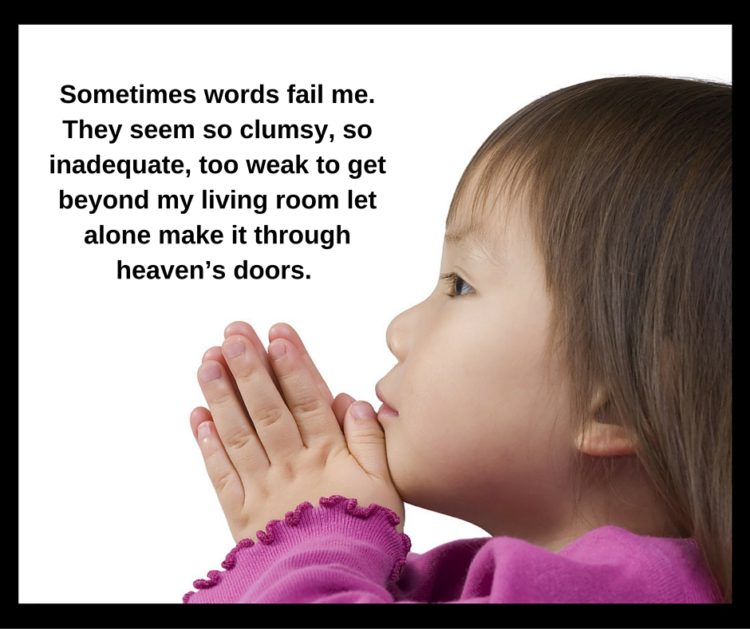It’s easy to get stuck praying the way we’ve always prayed. We are, after all, creatures of habit. What happens when the tried and true way you’ve always prayed seems to hit the ceiling and goes nowhere? My friend, April Yamasaki, shares her experience with silent prayer.
As part of the children’s time one Sunday morning, I said, “Sometimes when we pray in church, we use a lot of words, because sometimes prayer is like talking to God. But there are other ways to pray besides using our words. What do you think some of those other ways might be?”
“Doing something kind,” said one of the girls. “Being nice,” said one of the boys. “Music.” “Reading the Bible.”
“Sometimes we can pray in silence too,” I said. “We can pray without words.”
I wanted to try praying in silence with the children that morning, but I wasn’t sure they would be ready for it. So I had brought my children’s Bible with me, ready to read Psalm 23 instead. But the children seemed more focused than usual that morning, so I invited them to join me in silent prayer. Some bowed their heads and folded their hands. Some closed their eyes. One shy boy just looked at me and smiled. For a moment the sanctuary was quiet as we held silence together. That silence and that shared smile became our prayer.
_ _ _ _ _
As a pastor and writer, I’m a communicator who loves words. I work with words, play with words, and often pray with words both in public and when I’m alone. But sometimes words fail me. They seem so clumsy, so inadequate, too weak to get beyond my living room let alone make it through heaven’s doors.
How can I pray about the horrific shootings in Orlando earlier this month? Or talk to God about the kidnapping and killing of a Canadian tourist in the Philippines? How can I pray my fears and hopes over my husband’s recent job termination? I find myself searching for words and not finding them, or finding the words and not being able to put them together in a way that makes good sense.
So last fall, I wrote “How to Pray for the Syrian Refugee Crisis When You Can’t Find the Words,” then for Remembrance Day “How to Pray for Peace When You Can’t Find the Words,” and followed that in May with “How to Pray About Mental Illness When You Can’t Find the Words. Apparently, when it comes to prayer, I am becoming increasingly tongue-tied. I hadn’t intended that first blog article to become a series, but somehow one post became two and three, and I will quite likely keep adding to the impromptu series.
When I can’t find my own words for prayer, I’m grateful for the words of Scripture and the words of other prayerful people. When I’m feeling tongue-tied, I can be inspired by the words of others, receive them as a precious gift, pass them on, and offer them up to God.
My stumbling in prayer has also made me grateful for silence. When I can’t fill the formless void with words, I realize that I don’t have to. I can hold the people I love in God’s light and love even when I don’t know how best to pray for them. I can lament for those who are hurting even as I lean into the silence. It’s okay simply to be still, for “the Spirit helps us in our weakness; for we do not know how to pray as we ought, but that very Spirit intercedes with sighs too deep for words. And God, who searches the heart, knows what is the mind of the Spirit, because the Spirit intercedes for the saints according to the will of God” (Romans 8:26-27).
_ _ _ _ _
“Holding silence together is part of Quaker worship—a time to wait in expectation, a time to be drawn closer to God and to others, a time to be fully aware and to focus attention on God. Such times of corporate silence can also be powerful in a retreat setting, where participants might spend a day or several days in silence even during their common meals.
But practicing silence is not only for Quaker meetings, retreat houses, or other group settings. When I’m home alone, I can resist the temptation to turn on the television or listen to the radio. I can leave my earbuds at home when I go for a walk, enjoying the sounds of children playing, a dog barking, the wind in the trees, even the traffic, while I silently give thanks for the day and listen beyond those everyday sounds for God.
Observing silence is not only about finding peace and quiet in a noisy world. That’s part of it—but even more, it’s discovering that God speaks in the silence, that silence releases me to be myself before God and to pour out my heart in confession, worry, joy, shame, frustration, or whatever else I may be carrying. Silence allows me to appreciate God in a new way and allows for a depth of intimacy that may even make me uncomfortable at times.
In the fourteenth century, Christian mystic and theologian Meister Eckhart wrote, ”Nothing in all creation is so like God as silence.” I don’t fully understand what he means by that, but as I get used to silence, I find that I also deepen my relationship with God.”
(this section an excerpt from Sacred Pauses: Spiritual Practices for Personal Renewal by April Yamasaki, Herald Press, 2013)
_ _ _ _ _
For Reflection and Conversation: Are you someone who welcomes silence or do avoid it? How will silence be part of your summer this year?

Bio: April Yamasaki is lead pastor of Emmanuel Mennonite Church in Abbotsford, British Columbia. She has published numerous articles and several books, including Remember Lot’s Wife and Other Unnamed Women of the Bible (FaithQuest) and Making Disciples: A Manual for Baptism and Church Membership (Faith & Life Press). A third-generation Canadian of Chinese descent, she was born and raised in Vancouver, BC.
Please see below to share this article and scroll down to leave a comment. I’m sure April would love to hear from you!


Great article…we live in such a fast paced noisy world that we don’t take the time to sit and listen. It is those times when I am desperate and quiet that God truly does speak…In these days when we are told to use our words…there is a bigger need to Be Still and Know That I Am God…He does long to speak to us…
I”m glad this article resonates with you, Carolyn. Silence seems counter-cultural, and so necessary to remain well grounded in the midst of all that is happening. I like to take sacred pauses throughout the day to be still if only for a moment, to rest in God’s presence and power.
The primary thing that draws me toward silence is the desire to hear the voice of God. Though I can easily fill my life with noise and distractions, the deeper hope of my soul is to listen for God’s whispers that I can only tune into when I quiet myself and my surroundings. Great reflection, April. Thank you!